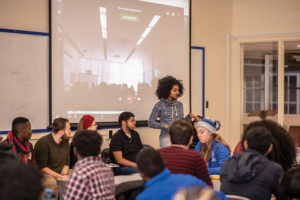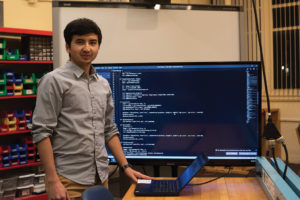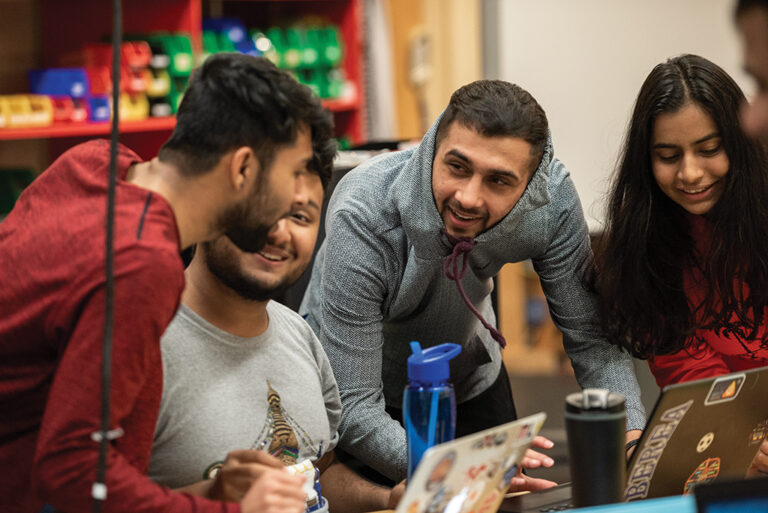Computer and Information Science majors work together during the Second Annual Berea Hack Day. From left to right: Ram Bastola ’19, Samriddha KC ’20, Basanta Phuyal ’20, and Ribana Phuyel ’21.
(Photo: Oluwatobi Adejumo ’20)
New endowment encourages IT alumni to connect with students
Currently, there are nine times as many jobs as people in information technology (IT),” said Dr. Jan Pearce, chair of Berea College’s Computer Science Department. It shouldn’t be surprising, then, that after just a decade of offering the major, computer science is one of the most sought-after degrees on campus.
There are three issues, though, facing the College in terms of serving the growing number of computer science majors. One is funding. Another is keeping pace with a globally-competitive industry known to advance as quickly as processing power. A third is that economically-disadvantaged students tend to lack the professional networks more affluent students at pricier schools often have access to for getting their foot in the door. A newly formed endowment aims to address all three.
Kevin Messer ’86, along with others, spearheaded the creation of the Computer Science Alumni Advisory Fund, an endowment that will assist computer-science students in networking with and learning from alumni working in the IT sector. Students will be able to request funds for specific projects, certifications or educational goals from a panel of alumni, who will evaluate requests, recommend which ones to fund and advise the requestors.

“The purpose of the fund is to encourage greater interaction between alumni who work in the IT field and students,” Messer said, “because alumni are always role models for students. Mark Zuckerberg, Bill Gates or Steve Jobs are more distant and less relatable than alumni who went through experiences similar to today’s students not that long ago.”
Messer also believes the process will allow students better opportunities to keep pace with technological changes.
“Not only is IT ubiquitous, it’s changing at an increasingly faster pace,” he said. “All over the world, individuals and organizations are trying to come up with the next great innovation.”
Keeping up with the rate of technological change is difficult for all organizations, according to Messer, who has worked as a programmer, project manager and consultant to senior executives during his career. Higher education institutions like Berea College have special challenges that can result in unintended funding gaps.
“Nevertheless, Berea College alumni are actively creating, implementing and managing technology changes in their careers,” Messer said. “The new endowed fund provides a structure for those IT alumni to engage directly with the computer-science program about their experiences and to help with funding gaps to meet the needs of students.”
Messer and Dr. Pearce see this the same way. “Our alumni are the best-placed people to know what the world is like right now because they’re out there,” she said. “This fund is helping us with one-on-one mentoring so our students who want a mentor can get one.”
It also gives computer science students a chance to hone their presentation and persuasive communication skills because receiving funding requires submitting a proposal to the alumni panel. Students will submit written proposals and be encouraged also to submit video proposals.
The Computer Science Department already invites alumni to serve on panels at Homecoming each year. Students ask alumni questions about how they got their first jobs, what employers look for on résumés and which classes proved most useful. In addition, IT alumni have introduced new technologies to students, shared success stories and advised them on issues challenging them in their careers.
“This new fund will allow us to take that to the next level,” Dr. Pearce said. It will also allow students to pitch for things like better equipment, software or funds to attend conferences and ‘hackathons,’ where they can connect with employers.”

Funding for hackathon and conference attendance is competitive. Currently, students can apply for scholarships or request money from Berea’s career development office. Students who are unable to obtain funds this way need to self-fund, and that is difficult for many students. When Dr. Pearce and a group of computer science students recently traveled to Orlando for a conference, she and another faculty member rented an Airbnb with enough extra rooms so students paying their own way had a place to stay.
Both the Alumni Advisory Endowment and conference attendance present students with the chance to network, which Dr. Pearce and Messer agree is vital for the cohort of students who attend Berea.
“Because Berea College students are economically disadvantaged, they usually lack the kind of familial connections that will often land a person his or her first job,” Dr. Pearce said.
“An alumni referral was how I got my first job,” Messer said, “and my experience is such an easy-to-replicate example. Each Berea alumnus has a network of contacts that they work with professionally to whom they could refer a Berea College graduate.”
Networking opportunities occur on campus as well, and the new endowment can encourage more of it. Recently, Rebeccah Hunter ’17, a software developer for Nationwide, persuaded her employer to visit Berea College for a computer science recruiting event.
“I was thrilled to have the opportunity to visit Berea and help students the same way other alumni had done for me,” Hunter said. “An endowment like this means more magic, more life-changing opportunities.”
The success of the program, naturally, will depend on alumni involvement and support.
“The hope,” Messer said, “is that alumni will see firsthand how they can benefit students through their time and experience. Over time, the model could be adopted by other academic areas.”


